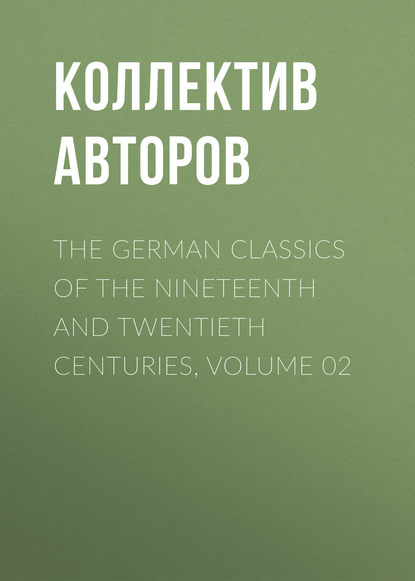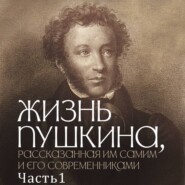По всем вопросам обращайтесь на: info@litportal.ru
(©) 2003-2025.
✖
The German Classics of the Nineteenth and Twentieth Centuries, Volume 02
Настройки чтения
Размер шрифта
Высота строк
Поля
They had now reached a place where Felix was to remain, and make trial of his surroundings, until they were disposed to grant a formal admission. They already heard from afar a cheerful singing; it was a game, which the boys were now enjoying in their play-hour. A general chorus resounded, in which each member of a large circle joined heartily, clearly, and vigorously in his part, obeying the directions of the superintendent. The latter, however, often took the singers by surprise, by suspending with a signal the chorus-singing, and bidding some one or other single performer, by a touch of his bâton, to adapt alone some suitable song to the expiring tune and the passing idea. Most of them already showed considerable ability, a few who failed in the performance willingly paid their forfeit, without exactly being made a laughing-stock. Felix was still child enough to mix at once among them, and came tolerably well out of the trial. Thereupon the first style of greeting was conceded to him; he forthwith folded his arms on his breast, looked upward, and with such a droll expression withal, that it was quite plain that no hidden meaning in it had as yet occurred to him.
The pleasant spot, the kind reception, the merry games, all pleased the boy so well, that he did not feel particularly sad when he saw his father depart; he looked almost more wistfully at the horse as it was led away; yet he had no difficulty in understanding, when he was informed that he could not keep it in the present locality. On the other hand, they promised him that he should find, if not the same, at all events an equally lively and well-trained one when he did not expect it.
As the superior could not be found, the overseer said: "I must now leave you, to pursue my own avocations; but still I will take you to the Three, who preside over holy things: your letter is also addressed to them, and together they stand in place of the Superior."
Wilhelm would have liked to learn beforehand about the holy things, but the other replied. "The Three in return for the confidence with which you have left your son with us, will certainly, in accordance with wisdom and justice, reveal to you all that is most necessary. The visible objects of veneration, which I have called holy things, are included within a particular boundary, are not mingled with anything, or disturbed by anything; only at certain times of the year, the pupils, according to the stages of their education, are admitted to them, in order that they may be instructed historically and through their senses; for in this way they carry off with them an impression, enough for them to feed upon for a long time in the exercise of their duty."
Wilhelm now stood at the entrance of a forest-valley, inclosed by lofty walls; on a given signal a small door was opened, and a serious, respectable-looking man received our friend. He found himself within a large and beautifully verdant inclosure, shaded with trees and bushes of every kind, so that he could scarcely see some stately walls and fine buildings through the dense and lofty natural growth; his friendly reception by the Three, who came up by-and-by, ultimately concluded in a conversation, to which each contributed something of his own, but the substance of which we shall put together in brief.
"Since you have intrusted your son to us," they said, "it is our duty to let you see more deeply into our methods of proceeding. You have seen many external things, that do not carry their significance with them all at once; which of these do you most wish to have explained?"
"I have remarked certain seemly yet strange gestures and obeisances, the significance of which I should like to learn; with you no doubt what is external has reference to what is within, and vice versa; let me understand this relation."
"Well-bred and healthy children possess a great deal; Nature has given to each everything that he needs for time and continuance: our duty is to develop this; often it is better developed by itself. But one thing no one brings into the world, and yet it is that upon which depends everything through which a man becomes a man on every side. If you can find it out yourself, speak out."
Wilhelm bethought himself for a short time, and then shook his head.
After a suitable pause, they exclaimed "Veneration!"
Wilhelm was startled.
"Veneration," they repeated. "It is wanting in all, and perhaps in yourself. You have seen three kinds of gestures, and we teach a threefold veneration, which when combined to form a whole, only then attains to its highest power and effect. The first is veneration for that which is above us. That gesture, the arms folded on the breast, a cheerful glance toward the sky, that is precisely what we prescribe to our untutored children, at the same time requiring witness of them that there is a God up above who reflects and reveals Himself in our parents, tutors and superiors. The second, veneration for that which is below us. The hands folded on the back as if tied together, the lowered, smiling glance, bespeak that we have to regard the earth well and cheerfully; it gives us an opportunity to maintain ourselves; it affords unspeakable joys; but it brings disproportionate sufferings. If one hurts oneself bodily, whether faultily or innocently; if others hurt one, intentionally or accidentally; if earthly chance does one any harm—let these be well thought of, for such danger accompanies us all our life long. But from this condition we deliver our pupil as soon as possible, directly we are convinced that the teachings of this stage have made a sufficient impression upon him; but then we bid him be a man, look to his companions, and guide himself with reference to them. Now he stands erect and bold, yet not selfishly isolated; only in a union with his equals does he present a front toward the world. We are unable to add anything further."
"I see it all," replied Wilhelm; "it is probably on this account that the multitude is so inured to vice, because it takes pleasure only in the element of ill-will and evil speech; he who indulges in this, soon becomes indifferent to God, contemptuous toward the world, and a hater of his fellows; but the true, genuine, indispensable feeling of self-respect is ruined in conceit and presumption."
"Allow me, nevertheless," Wilhelm went on, "to make one objection: Has it not ever been held that the fear evinced by savage nations in the presence of mighty natural phenomena, and other inexplicable foreboding events, is the germ from which a higher feeling, a purer disposition, should gradually be developed?"
To this the other replied: "Fear, no doubt, is consonant with nature, but not reverence; people fear a known or unknown powerful being; the strong one tries to grapple with it, the weak to avoid it; both wish to get rid of it, and feel happy when in a short space they have conquered it, when their nature in some measure has regained its freedom and independence. The natural man repeats this operation a million times during his life; from fear he strives after liberty, from liberty he is driven back into fear, and does not advance one step further. To fear is easy, but unpleasant; to entertain reverence is difficult but pleasing. Man determines himself unwillingly to reverence, or rather never determines himself to it; it is a loftier sense which must be imparted to his nature, and which is self-developed only in the most exceptionally gifted ones, whom therefore from all time we have regarded as saints, as gods. In this consists the dignity, in this the function of all genuine religions, of which also there exist only three, according to the objects toward which they direct their worship."
The men paused. Wilhelm remained silent for awhile in thought; as he did not feel himself equal to pointing these strange words, he begged the worthy men to continue their remarks, which too they at once consented to do.
"No religion," they said, "which is based on fear, is esteemed among us. With the reverence which a man allows himself to entertain, whilst he accords honor, he may preserve his own honor; he is not at discord with himself, as in the other case. The religion which rests on reverence for that which is above us, we call the ethnical one; it is the religion of nations, and the first happy redemption from a base fear; all so-called heathen religions are of this kind, let them have what names they will. The second religion, which is founded on that reverence which we have for what is like ourselves, we call the Philosophic; for the philosopher, who places himself in the middle, must draw downward to himself all that is higher, and upward to himself all that is lower, and only in this central position does he deserve the name of the sage. Now, whilst he penetrates his relations to his fellows, and therefore to the whole of humanity, and his relations to all other earthly surroundings, necessary or accidental, in the cosmical sense he lives only in the truth. But we must now speak of the third religion, based on reverence for that which is below us; we call it the Christian one, because this disposition of mind is chiefly revealed in it; it is the last one which humanity could and was bound to attain. Yet what was not demanded for it? not merely to leave earth below, and claim a higher origin, but to recognize as divine even humility and poverty, scorn and contempt, shame and misery, suffering and death; nay, to revere and make lovable even sin and crime, not as hindrances but as furtherances of holiness! Of this there are indeed found traces throughout all time; but a track is not a goal, and this having once been reached, humanity cannot turn backward; and it may be maintained, that the Christian religion having once appeared, can never disappear again; having once been divinely embodied, cannot again be dissolved."
"Which of these religions do you then profess more particularly?" said Wilhelm.
"All three," answered the others, "for, in point of fact, they together present the true religion; from these three reverences outsprings the highest reverence, reverence for oneself, and the former again develop themselves from the latter, so that man attains to the highest he is capable of reaching, in order that he may consider himself the best that God and nature have produced; nay, that he may be able to remain on this height without being drawn through conceit or egoism into what is base."
"Such a profession of faith, developed in such a manner, does not estrange me," replied Wilhelm; "it agrees with all that one learns here and there in life, only that the very thing unites you, that severs the others."
To this the others replied: "This confession is already adhered to by a large part of the world, though unconsciously."
"How so, and where?" asked Wilhelm.
"In the Creed!" exclaimed the others, loudly; "for the first article is ethnical, and belongs to all nations: the second is Christian, for those struggling against sufferings and glorified in sufferings; the third finally teaches a spiritual communion of saints, to wit, of those in the highest degree good and wise: ought not therefore in fairness the three divine Persons, under whose likeness and name such convictions and promises are uttered, to pass also for the highest Unity?"
"I thank you," replied the other, "for having so clearly and coherently explained this to me—to whom, as a full-grown man, the three dispositions of mind are not new; and when I recall, that you teach the children these high truths, first through material symbols, then through a certain symbolic analogy, and finally develop in them the highest interpretation, I must needs highly approve of it."
"Exactly so," replied the former; "but now you must still learn something more, in order that you may be convinced that your son is in the best hands. However, let this matter rest for the morning hours; rest and refresh yourself, so that, contented and humanly complete, you may accompany us farther into the interior tomorrow."
WINCKELMANN AND HIS AGE (1804)
TRANSLATED BY GEORGE KRIEHN, PH. D
TO HER MOST SERENE HIGHNESS THE DUCHESS ANNA AMALIA OF SAXE-WEIMAR AND EISENACH
Most Serene Princess,
Most Gracious Lady,
Another benefaction has been added to the many which art and science owe to Your Highness by the most gracious permission to publish the following letters of Winckelmann. They are addressed to a man who had the happiness of counting himself among your servants, and soon afterward of living in close relation with Your Highness, at the time when Winckelmann found himself in the most embarrassing circumstances, the straightforward and touching narration of which one cannot read without sympathy.
Had these pages come to the attention of Your Highness in those days, the dictates of your noble and charitable heart would have immediately put an end to such distress, changed the fate of a most excellent man, and directed it more happily for the future.
But who indeed ought to think of what might have happened, when so many gratifying things that actually took place lie before us?
Your Highness has, since that time, established and supported much that is useful and promotive of happiness, while our gracious and sympathetic Prince adds constantly to the great number of his benefactions.
One may without vainglory recall the good that for us and for others has been accomplished in our limited circle, the least significant aspects of which cannot but excite the observer's admiration, which would be greatly increased if a well informed writer should take the trouble to describe its origin and growth.
The intention of the benefactors was never selfish but was always directed toward the good to be accomplished. The higher culture of this land all the more deserves an annalist, since much formerly existed and flourished of which all visible traces have now disappeared. May Your Highness, in the consciousness of having been the prime mover and constant participant in these enterprizes, attain that peculiar domestic happiness, a hale and hearty old age, and long continue to enjoy the brilliant period now opening for our circle, in which we hope that all that has been accomplished will be further increased, unified and strengthened, and thus handed down to posterity.
Cherishing the flattering hope that I shall continue to rejoice in that inestimable favor with which Your Highnesses have deigned to adorn my life, I am, with respectful devotion,
Your Most Serene Highness' obedient servant,
J. W. VON GOETHE
PREFACE
The friends of art who have for several years been associated at Weimar are surely privileged to speak of their relation to the general public, because (and this is the final test) they have always expressed similar convictions and have been guided by well tried principles. Not that, limited to certain modes of apprehending matters, they have obstinately maintained a single point of view. On the contrary, they willingly confess that they have learned much from diverse expression of opinion, all the more so as they now learn with pleasure that their efforts in behalf of culture are constantly becoming more closely allied to the general progress of higher education in Germany.
With much gratification they call attention to the Propyloea, to the critical and descriptive programs of no less than six exhibitions of painting and statuary, to the many expressions of opinion in the _Jenaisische Litteraturzeitung, and to the published translation of the Life of Benvenuto Cellini.
Although these writings have not been printed and bound in the same volumes and do not form parts of a single work, they have, nevertheless, all been written in the same spirit. They have proved a leaven to the whole, as we are learning slowly, but not without gratification; so that there is no longer occasion to remember ingratitude often experienced, and open or secret opposition.
The present publication is an immediate sequel to the foregoing works, and of its contents we mention here only the most important.
PLAN FOR A HISTORY OF ART DURING THE EIGHTEENTH CENTURY
The historical conception of related conditions promotes the more rapid development of the artist as well as of the man. Every individual, especially if he be a man of capacity, at first seems far too important to himself. Trusting in his independent power, he is inclined to champion far too quickly this or that maxim; he strives and labors with energy along the path he has himself chosen; and when at length he becomes conscious of his one-sidedness and his error, he changes just as violently, enters upon another perhaps equally erroneous course, and clings to principles equally faulty. Not until late in life does he become aware of his own history and realize how much further a constant development in accordance with well tested principles might have led him.
If the connoisseur owes his insight to history alone, which embodies the ideas which give rise to art, for the young artist the history of art is of the greatest importance.
He should not, however, search in it for indistinct models, to be pursued passionately, but for the means of realizing himself and his point of view, with its limitations. But unfortunately, even the immediate past is seldom instructive to man, through no fault of his own. For while we are learning to understand the mistakes of our predecessors, time is itself producing new errors which, unobserved, ensnare us, and the account of which is left to the future historian with just as little advantage to his own generation.
But who would indulge in such mournful observations, and not rather endeavor to promote the greatest possible clearness of view in his own branch of study? This is the duty assumed by the writer of the present sketch, the difficulty of which will be seen by connoisseurs, who, it is hoped, will point out its deficiencies and correct its imperfections, thereby making a satisfactory future work possible.
WINCKELMANN'S LETTERS To BERENDIS

















